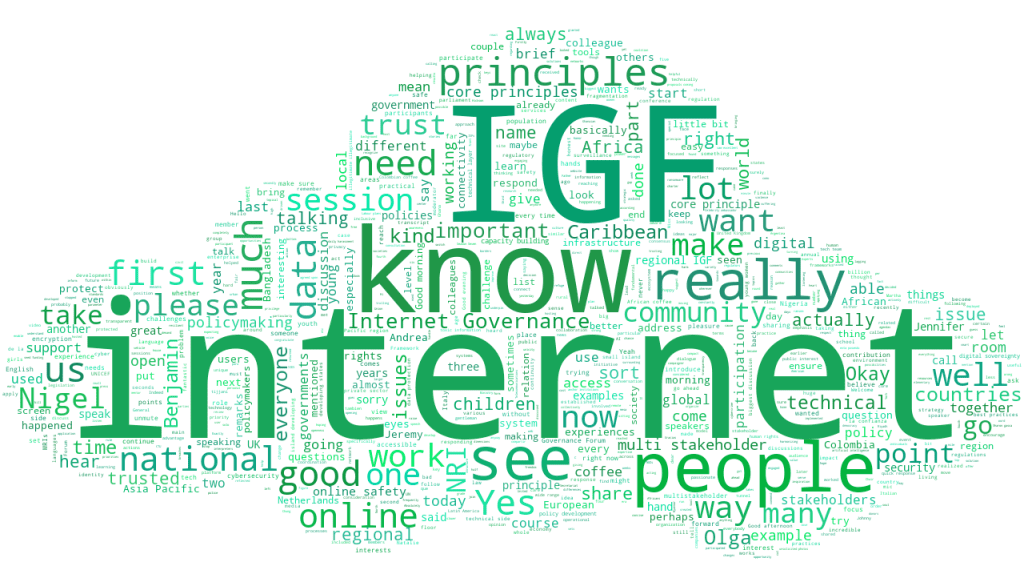(NRIs Main Session) Safeguarding and strengthening the core principles of a trusted internet
2 Dec 2022 07:00h - 08:00h
Event report
The session was driven by two main issues: the core principles of a trusted internet, and policy and technical means that can be deployed to support the core principles. National and regional IGF initiatives (NRI) were invited to share their views and experiences.
Several NRIs stated that bridging the digital divide is a precondition for discussing trust. For the North African regional IGF, this implies the uniqueness of the internet and its cross-border character, access and use of its infrastructure, and the openness and availability of its content. The Caribbean IGF underlined principles of accessibility, usefulness, and inclusiveness. The Asia-Pacific IGF added that English is not spoken by most of those who are not yet online, and invited more efforts to introduce multilingualism (e.g., work of the Universal Acceptance Working Group in terms of domain names) and content in local languages. The Nigerian IGF stressed the need to reflect on and protect local languages and identities. Participants in the room also reflected on last mile connectivity, accessibility, and affordability, especially in rural areas. A concern was raised that internet fragmentation could affect end-to-end service and interoperability, and put these principles at risk.
Participants recognised access to the internet as a component of human rights. Several NRIs shared the view that respect for human rights is among the core principles of a trusted internet. This includes, but is not limited to, protection of privacy (especially for young people), consumer protection, digital employment, freedom of expression, and access to information. As main impediments, participants identified surveillance, collection and abuse of personal data (including for and by AI), and abuse of power by governments, such as inciting hate speech or introducing internet shutdowns, including the IGF host country, Ethiopia.
A number of core principles relate to governance. For the IGF of the Netherlands, principles include a rule of law and fairness and accountability (for both the public sector and companies); multistakeholder governance (including in policy-making); openness and transparency in decision making processes; and a human-centric approach (i.e., prioritising the needs of users and serving individuals). Public interest was added to this list by participants. The Youth IGF emphasised the importance of engaging young people in policy making, which was reaffirmed by many participants. The Columbian IGF also noted the importance of a trusted, reliable, and inclusive governance ecosystem.
Several core principles related to security and safety were outlined as well, such as confidentiality (endangered by backdoors and attempts to break encryption), data protection (challenged by frequent and massive data breaches), security of networks and the infrastructure, and transparent and trustworthy algorithms (particularly related to AI). In regard to online safety, participants emphasised protection of children and young women from toxic information, hate speech and violence, and self-harm and suicide.
Several NRIs also shared experiences and ideas of how those principles can be underpinned through technical and policy means. Two interesting online tools were shared by the Dutch IGF: internet.nl, an open-source platform on implementation of security standards; and ‘No More Ransom’ platform, providing many keys for unlocking files captured by ransomware.
Concerning strengthening multistakeholder processes, many NRIs already embrace the core IGF principles. Raising awareness and developing capacities among stakeholders is another important mechanism. The Italian IGF involves policy-makers in discussions of national implications of emerging EU regulations, like the Digital Services Act; and media professionals (as moderators or participants) to extend media coverage. The Bangladesh IGF has supported a national School of Internet Governance. The Netherlands IGF supports the Global Forum on Cyber Expertise, the leading global multistakeholder venue on cyber capacity building. However, participants stressed that more has to be done on awareness of global and national IGF on national levels, starting from this IGF 2022.
In regard to policy mechanisms, IGF Italy is promoting the Internet Rights Charter with each new government, asking for its integration throughout national policies. The Caribbean IGF (CIGF) discusses digital strategies, digital economies, telecom regulations, and environmental issues (of high relevance for small island developing countries (SIDS)). It also publishes ‘A Caribbean Internet Governance Policy Framework’ (now in its 3rd edition), which documents attempts to harmonise regional policies. Through the Caribbean Telecommunication Union (CTU), CIGF involves public institutions from the region, provides regional coordination among several national IGFs in the Caribbean, but also reaches out and supports IGFs in other SIDS around the world. Participants proposed the NRIs to also be more active in international processes, such as through providing contributions to the Global Digital Compact and the WSIS+20 process.
By Vladimir Radunovic
The session in keywords
Related event


